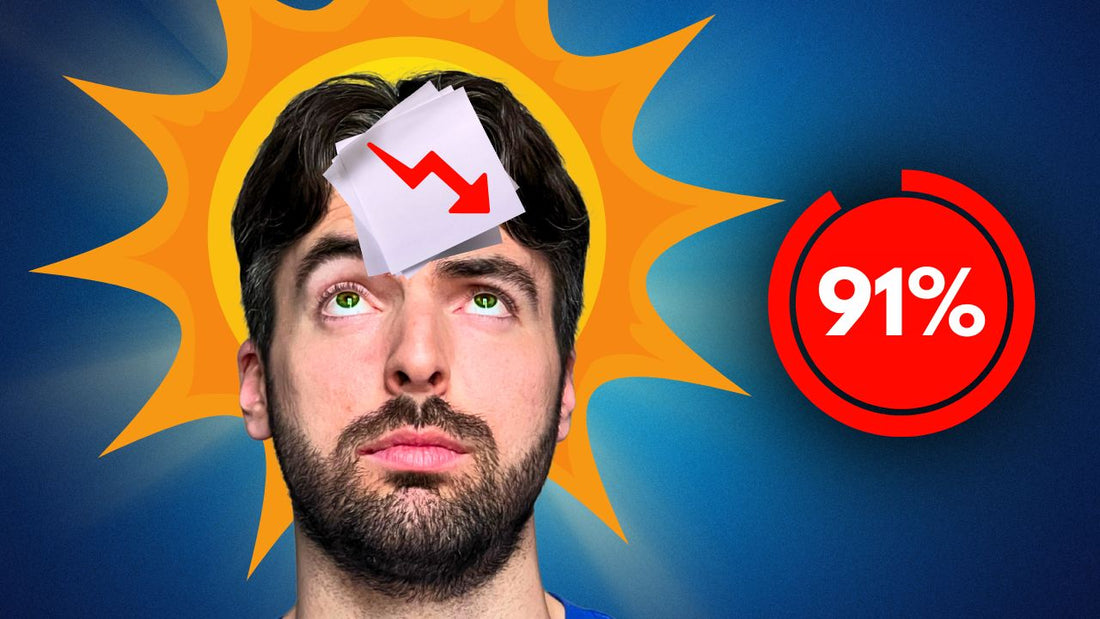
Vitamin D: 91% of people over 50 are deficient without knowing it. Here's how to integrate it.
Share
Have you ever thought you might be deficient in vitamin D? If you're over 50, the answer is probably yes, even if you don't know it.
We are talking about a vitamin that is fundamental for health, but that most people neglect. Not only for bones, as one tends to believe, but also for the well-being of the brain, the immune system and metabolism.
So how can you increase vitamin D effectively? What are the real benefits of adequate supplementation?
In this article I will take you step by step to discover this vitamin, revealing how to take it in the right way and why it is so important.
Vitamin D: Why Are So Many People Deficient?
You may have heard that vitamin D is the sunshine vitamin . And it’s true: our skin produces it when exposed to sunlight.
Yet, despite living in a sunny country like Italy, many people don't get enough of it .
Just think about your daily routine:
- We work in the office all day, with little time to be outdoors.
- When we go out, we cover our skin with clothes and sunscreen (rightly so).
- If we live in areas with little sunlight or only expose ourselves to the sun during the least effective hours, vitamin D synthesis is minimal.
To make matters worse, as you age, your skin becomes less efficient at synthesizing vitamin D , so even if you expose yourself to the sun you may not produce enough.
Diet? Unfortunately, it doesn't help much, because this vitamin is only present in a few foods such as fatty fish (salmon, mackerel, herring), eggs and liver. In any case, the quantities are too low to cover the daily requirement.
The result? Most people over 50 are deficient without even knowing it.

Vitamin D and health: not just bones!
When we talk about vitamin D, our first thoughts immediately go to bone health . And it's true: this vitamin helps absorb calcium, reducing the risk of osteoporosis and fractures.
But his role goes far beyond that.
1. Brain and memory
If you've been feeling mentally tired lately, having trouble concentrating, or noticing some minor memory problems, you may have low vitamin D levels .
Many studies suggest that this vitamin can prevent or slow cognitive decline , especially in older people. For example, a 12-month supplement showed significant improvements in verbal and performance tests.
👉 And this study says so here.
2. Immune system
Do you get sick often, especially during the change of seasons? Vitamin D also plays a fundamental role in the defense against infections . Some studies report that inadequate levels are associated with a greater susceptibility to seasonal illnesses.
3. Mood and psychological well-being
Feeling down for no reason? Your mood can also be affected by vitamin D deficiency. Scientific evidence suggests a correlation between low levels of this vitamin and a higher risk of depression and poor quality of life .
How to properly integrate vitamin D
Now the question is: if I am deficient, how do I increase my vitamin D levels?
1. Sun and food
The first piece of advice is to expose yourself to the sun for at least 15 minutes a day , possibly in the early hours of the morning and without sunscreen.
As far as nutrition is concerned, the foods richest in vitamin D are:
- Fatty fish (salmon, mackerel, herring)
- Eggs (especially the yolk)
- Liver
But, as mentioned before, it is difficult to meet the daily requirement through diet alone.
2. Supplements: D2 or D3?
There are two forms of vitamin D on the market: D2 and D3 . Which is better?
D3 is the most effective form , because it is more easily activated by the body. Fortunately, almost all supplements now contain vitamin D3.
3. When and how to take it?
For optimal absorption, vitamin D should be taken after a meal rich in good fats (such as avocado, nuts, olive oil, or fatty fish).
4. How much to take?
The ideal dose depends on your blood vitamin D levels, so it's always a good idea to check with your doctor before starting any supplement. But in general:
- 25 to 100 micrograms per day is a good maintenance dose.
- Higher doses should only be taken under strict medical supervision , because an excess can cause hypercalcemia (too much calcium in the blood).
👉 And this study says so here .

How long does it take to see benefits?
Don't expect immediate results. Studies indicate that it takes at least 12 weeks to 12 months to notice real improvements.
👉 And this study says so here.
Bottom line: Monitoring is key!
If you are over 50, checking your vitamin D blood levels is essential . If you are deficient, you can start supplementing, but always under the advice of your doctor, especially if you take medications or have pre-existing conditions.
Exposing yourself to the sun, choosing the right supplements and monitoring your values are the keys to improving not only your bone health, but also your mind, immune system and general well-being .

